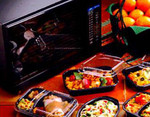
The development of self-venting pouches or trays that can be transferred directly from the freezer to the microwave, eliminating consumers’ need to open or puncture packaging, has encouraged category growth, the report states.
Helped spur growth
“This feature has helped spur growth in the largest end-user segment: entrees (which in 2011 accounted for 29% of all US sales of primary packaging materials for microwaveable products) – as well as the fastest growing segment: vegetables,” said an Allied Development spokesman.
The study forecasts 18.5% annual value sales growth to 2016 for primary packaging materials for microwaveable vegetables.
The application of susceptor technology enabling the taste and quality of microwave foods to more closely resemble oven cooked products had contributed to the high growth rate of certain packaging forms, the report states.
Paperboard cartons and sleeves
Susceptors had boosted sales of paperboard cartons and sleeves for hand-held entrees and pizza slices, it claims.
“Susceptors enable microwave-prepared foods to more closely match the quality, taste and texture of food prepared in conventional ovens,” said the Allied Development spokesman.
“This technology has been instrumental in the relatively high growth rate of folding cartons as a type of microwaveable packaging, which the study forecasts to be a 13.2% growth rate per year through 2016.”
Susceptors are commonly made of metallised film, ceramics and metals. They absorb microwaves and in turn radiate heat in other ways, which can then be used to replicate traditional cooking methods, providing crisping or broiling effects.





